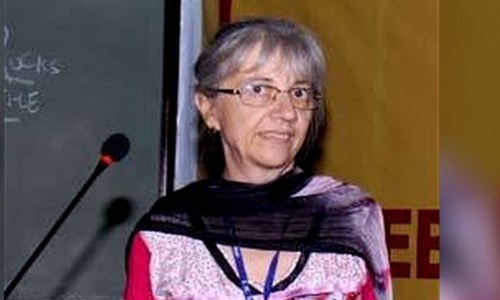KARACHI: While commuting the sentence handed down by an antiterrorism court to a militant for attempted murder of American educationist Dr Debra Lobo, the Sindh High Court on Friday observed that the case did not fall within the ambit of the Anti-Terrorism Act (ATA) of 1997.
The SHC said that the prosecution could not be able to prove through cogent evidence that appellant Saad Aziz attacked Dr Lobo with “design and intent to spread terror in the society”.
An ATC had sentenced Saad Aziz to a collective sentence of 20 years — 10-year each for attempted murder under the Pakistan Penal Code (PPC) and committing an “act of terror” punishable under the ATA.
The convict, who also had also been handed down death sentence by a military court in the Safoora bus carnage case, filed an appeal against his conviction.
After hearing both the sides and examining the record and proceedings a two-judge bench comprising Justice K. K. Agha and Justice Khadim Hussain Tunio set aside the conviction awarded under the ATA and commuted the 10-year term handed down under the PPC into the period the appellant had already undergone while in prison.
A counsel was provided to the appellant on state expenses after he informed the bench that he could not financially afford a lawyer.
The appellant’s lawyer did not press the appeal on merit and pleaded to reduce the sentence awarded under the PPC.
The bench in its order observed that the prosecution had successfully established the charge under the PPC by examining various witnesses including an eyewitness.
“The appellant has left himself at the mercy of court to seek a chance for reformation and as per jail rule, the appellant has already served out over six-and-half years in jail without remission, which was suffice for court to reform the appellant,” it said.
Regarding the conviction under the ATA, it said same cannot be sustained, adding that applicability of Section 6 of the ATA had been a long-standing controversy before the court, but the Supreme Court had devised a guideline for handing such cases in its judgement in case of Ghulam Hussain verses state reported in 2020.
The SHC further stated that as per the judgement of the apex court, offence under ATA was a “strict mens rea crime and it was important for prosecution to establish such mens rea alongside actus reus, which alas was not done in the present case”.
“It was also held in the case of Ghulam Hussain (supra) the creation of fear and insecurity in the society is not by itself terrorism unless the motive for the same is to create fear or insecurity in the society and where fear and insecurity are the by-product of an act done to satisfy some purpose, the same does not constitute terrorism either”, it concluded.
The appellant along with his accomplices was convicted of shooting at and wounding Dr Lobo, the then vice principal of Karachi’s Jinnah Medical and Dental College, on Shaheed-i-Millat Road, in April 2015.
Published in Dawn, February 26th, 2022















































Dear visitor, the comments section is undergoing an overhaul and will return soon.